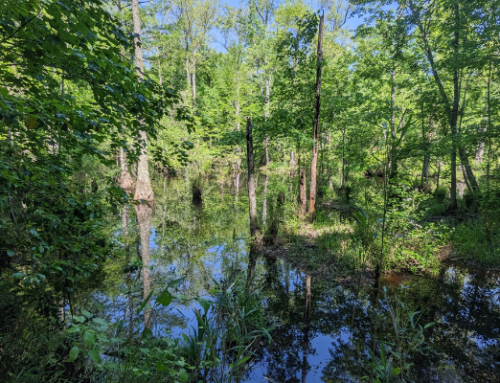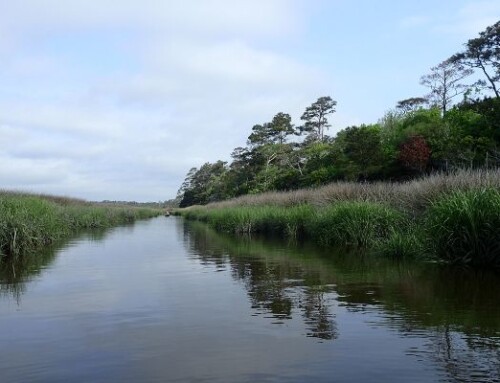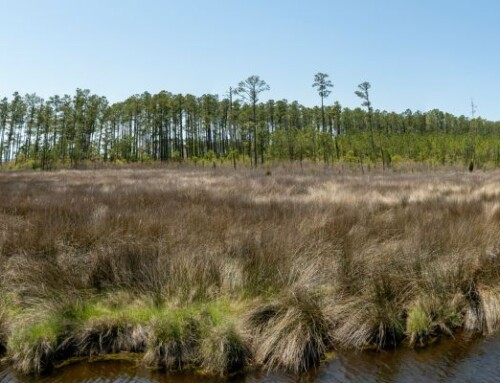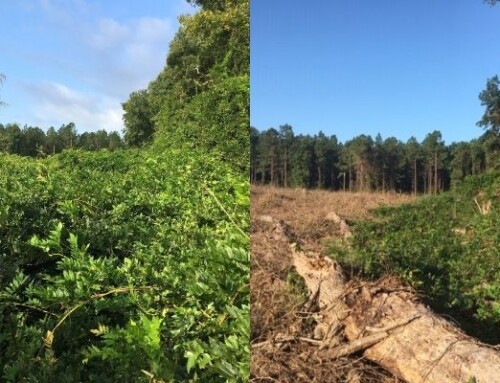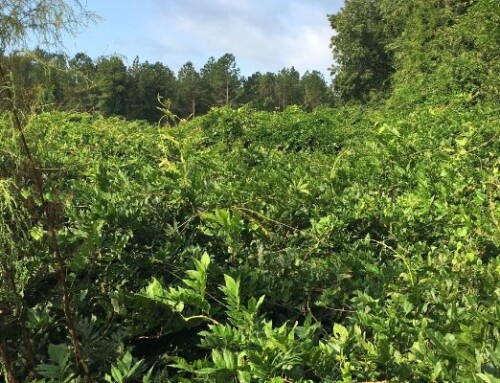COASTAL LAND TRUST SAVES ANOTHER TOP 40 PROJECT
SALTERS CREEK TRACT “DOWN EAST”
NC WILDLIFE COMMISSION AND US MARINE CORPS JOIN AS PARTNERS
More than 5,400 acres along Salters Creek, with a spectacular 17 miles of waterfront, has been saved by the North Carolina Coastal Land Trust. The Salters Creek project was made possible thanks to partnerships with North Carolina Wildlife Resources Commission and the U.S. Marine Corps, and the support of eight partnering organizations and funders. The Coastal Land Trust purchased the property from The Trustees of the Sailors’ Snug Harbor in the City of New York, a nonprofit corporation.
“This property represents the best of what is left Down East in terms of relatively pristine natural areas,” said Janice Allen, Director of Land Protection for the Coastal Land Trust. Identified as one of the Coastal Land Trust’s Top 40 priority conservation projects, the Salters Creek tract features estuarine marsh, pocosin, and longleaf pine forest. It is a natural heritage area ranked by the state as having exceptional ecological significance, as well as an Important Bird Area, as designated by National Audubon Society. The property provides habitat for 23 rare plant and animal species.
The 5,400-acre “Down East” property purchased by the Coastal Land Trust adjoins the 14,494-acre Cedar Island National Wildlife Refuge, and is across Long Bay from the Marine Corps Air Station (MCAS) Cherry Point’s 11,000-acre Piney Island Bombing Range (BT-11) in Carteret County, resulting in a significantly large, landscape-sized conservation area.
As part of the transaction, the Department of Defense provided funds for the purchase of a restrictive easement over the property. The restrictive easement prohibits incompatible development of the property, which might otherwise compromise the safety of pilots and crew who fly over the property for training missions. “The goals of the Readiness and Environmental Protection Integration program are certainly met with this easement”, stated Colonel Todd Ferry, Commanding Officer, MCAS Cherry Point. “Through our partnership with the Coastal Land Trust and the State of North Carolina, we have shared the burden of protecting this strategic property which will help us sustain training capabilities at Piney Island for future generations.”
The Coastal Land Trust transferred the majority of the tract, approximately 5,170 acres, to the State of North Carolina to be managed by the North Carolina Wildlife Resources Commission as public game lands. The 5,170 acres now owned by the Commission will be managed using prescribed fire as a primary tool, to promote and enhance native flora and fauna. The Coastal Land Trust will retain the remaining 311 acres to be managed as a nature preserve.
“We are extremely excited about this large acquisition,” said Brian McRae, Land and Water Access Section Chief for the Commission. “This property will provide tremendous opportunities for birding as well as hunting for deer, bear, turkey and small game.”
The Salters Creek project attracted support from an array of different conservation funds, agencies, and philanthropists, testifying to its significance and to its abundant and varied natural values.
Beginning with a grant from a private philanthropist for a long-term option on the property, the Coastal Land Trust eventually secured grants from a total of eight different funders to complete the purchase of the property, including the Department of Defense’s Readiness and Environmental Protection Integration Program, NC Clean Water Management Trust Fund, U.S. Fish and Wildlife Service’s North American Wetlands Conservation Act program, N.C. Wildlife Resources Commission, Enviva Forest Conservation Fund, Duke Energy’s Water Resources Fund, and the North Carolina Native Plant Society.
Walter Clark, Executive Director of North Carolina Clean Water Management Trust Fund, noted that “The acquisition of the Salters Creek Landing property touches on several critical objectives of the Clean Water Management Trust Fund. Conservation of the property, which is classified as an exceptional Atlantic Natural Area, protects 17 miles stream buffer and 4,285 acres of wetland. Additionally, the acquisition protects North Carolina’s military mission which is so important to national defense and North Carolina’s economy. And finally, much of the property will be open for public use as North Carolina Wildlife Commission game land.”
“The Coastal Land Trust is grateful to all the participating grant-making agencies, individuals and funders,” said Ms. Allen, “for their investments in this amazing conservation project.”
Grant-making agencies supporting this project:
North Carolina Wildlife Resources Commission, Readiness and Environmental Protection Integration Program, NC Clean Water Management Trust Fund, US Fish and Wildlife Service’s North American Wetlands Conservation Act program, Enviva Forest Conservation Fund, Duke Energy Foundation, North Carolina Native Plant Society






